Perfect butternut smoothie
This perfect butternut smoothie is all about more coloured foods. There is such strong research confirming that making sure we are daily getting our yellows, greens and purples for example gives us protection against a host of diseases.
It is also all about the phytonutrients like beta-carotene[1] and sulforaphane that act as antioxidants; they mop up the nasty free radicals that make us prone to malignant tumours.
But many of them like kale are not particularly tasty so we need to dicky them up in simple, quick ways; smoothies are perfect because they are so easy to make.
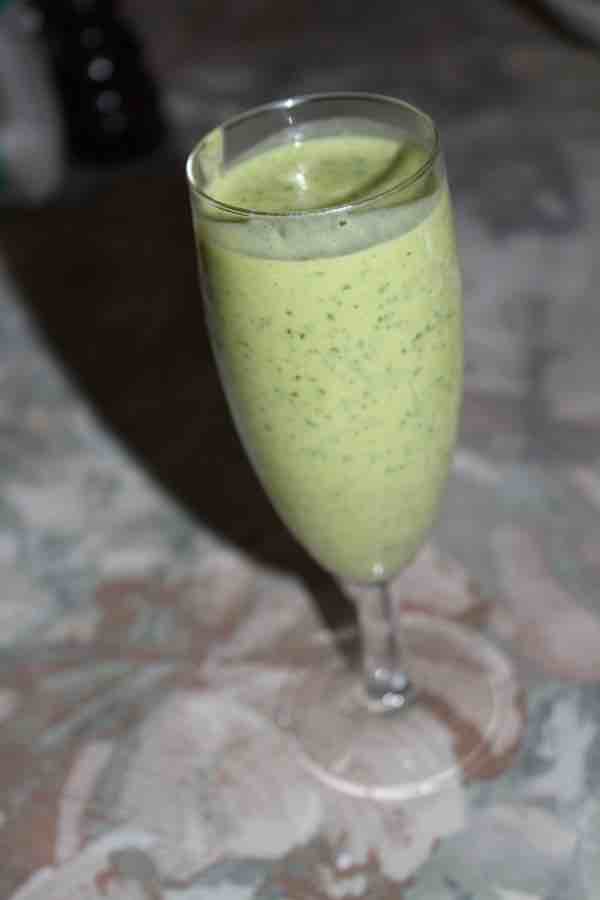
I could have fooled you with this one. I wonder how many people would have worked out, even after tasting it that our smoothie has butternut as the main ingredient. The dark-green colour of the kale overpowers it.
The beauty of smoothies is that they are seriously alkalising and help to balance the effect of so many acidic foods that we humans enjoying indulging in; but are not good for us.
Perfect butternut smoothie
- 2 TBSP butternut-soup.
- Handful of deveined and chopped-kale.
- 1/4 banana.
- Slither of sweet or spicy-pepper.
- 1 TBSP coconut-cream.
- Slosh of milk; coconut would be good too.
- 1 tsp natural-honey
Use a stick-blender.
Toss all the ingredients together and blend; one of the beauties of this smoothie is just how quickly you can make it. Little more than a few minutes but it is of course dependent on having the butternut soup at hand.
The perfect butternut smoothie is a simple way to make less palatable foods like dark-green leafy vegetables more interesting. And let's be honest; you will never find fresh young kale like this in the supermarket. Yet it is so easy to grow.
I have been greatly influenced by Blue Zone longevity. Those five areas of the world where folk regularly live to vibrant and strong nineties; and ten times as many reach one hundred. In all of them they plant, nurture and eat much of their own food.
Growing kale has improved almost every aspect of our health; bones, bowels and eyesight, just to mention a few.
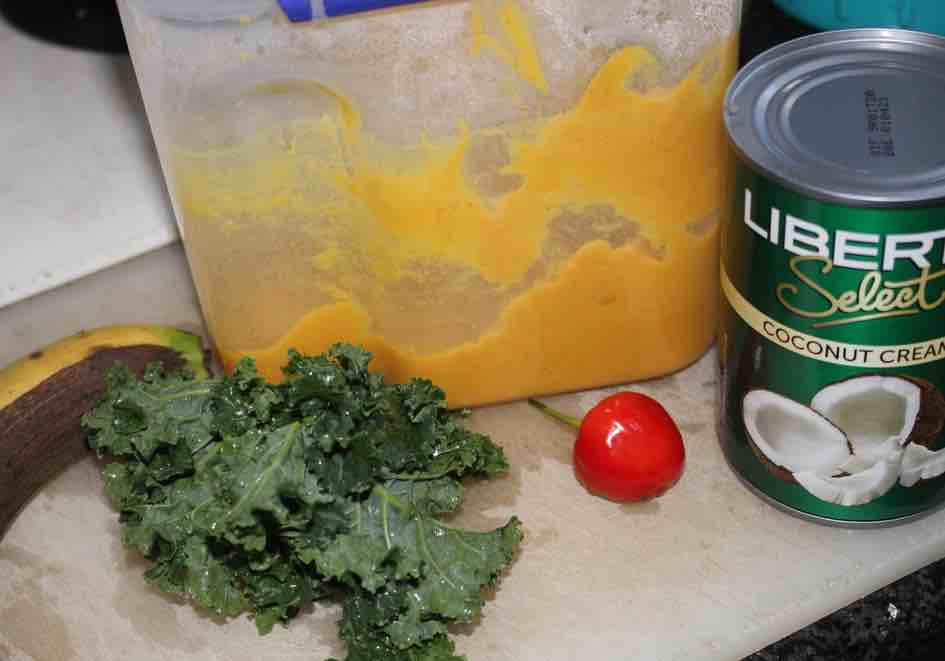
Having enjoyed many visits to my grandparents banana farm as a child I was spoiled rotten. Today's fruit is so awful both in taste and nutrition; they go black and ghastly quickly like that above. It was picked grass-green, ripened in an ethylene chamber and the flavour is a far cry from the real McCoy.
Still living at 4000 feet above sea-level one either takes it as it comes, or refuse to buy and eat bananas.
Butternut for greater immunity
Butternut is a wonderful source of beta-carotene, the precursor of vitamin A. In these days of virulent infectious diseases many nutrients are particularly important in promoting our resistance to succumbing to pathogens.
Most of us despite the best will in the world shall ultimately be exposed to these nasty viruses but we do have a window of opportunity to support our immune systems.
Twenty minute walks most days reduces the prevalence and severity of upper respiratory infections by over 40%. That's massive; especially after a starchy meal.
Beta-carotene also gives a measure of protection against serious metastatic tumours, poor vision and weak bones. We think it so important that year round we have butternut soup on hand virtually every day. Two tablespoons go into the dough for our artisan bread.
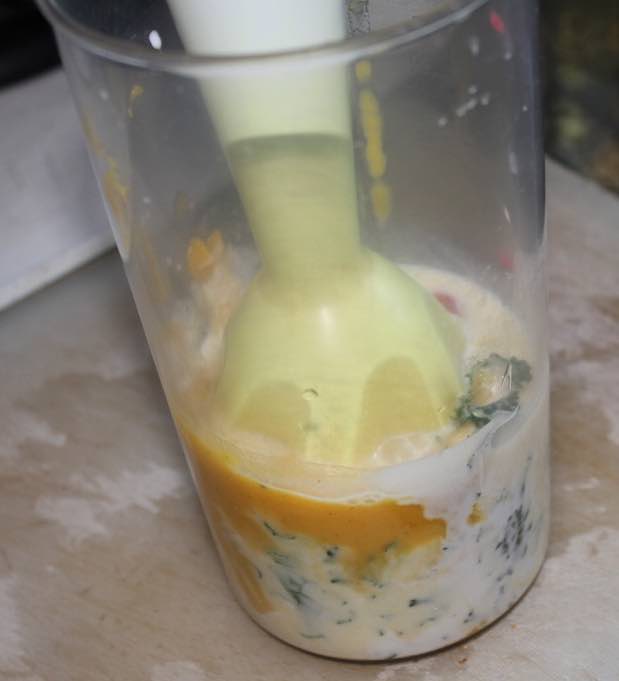
They are a wonderful vegetable to grow if you have a large garden but they really do best in the compost heap; then you get these beauties.
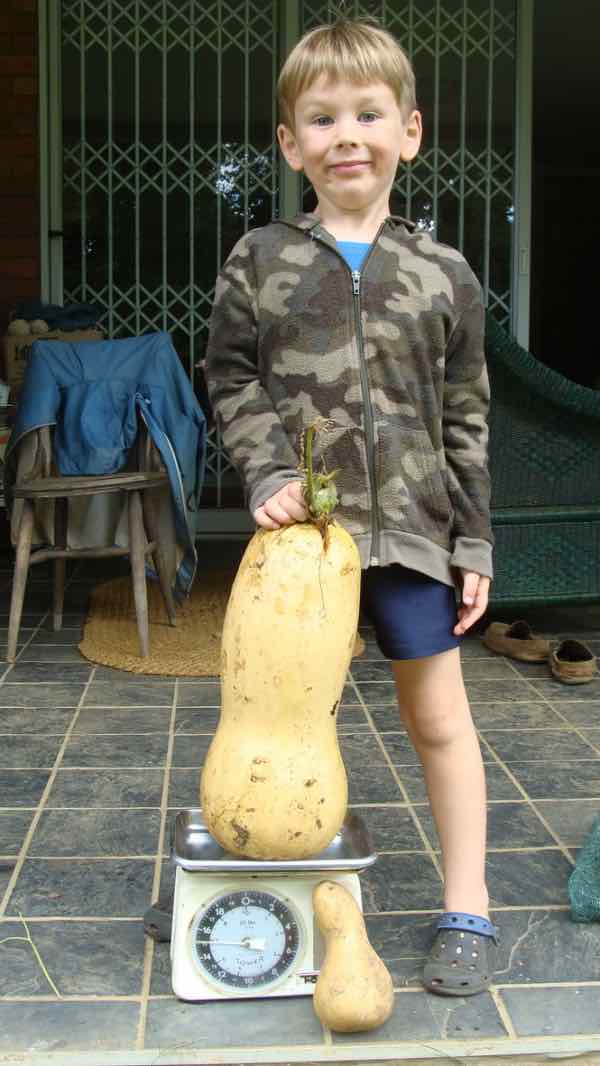
Kale to prevent macular degeneration
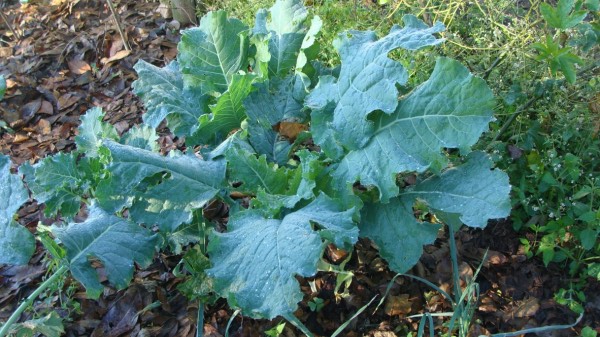 Kale leads the way to prevent macular degeneration, the commonest cause of blindness
Kale leads the way to prevent macular degeneration, the commonest cause of blindnessKale is one of the dark-green leafy gems that rivals broccoli for the "queen of the table" award. It has so many virtues but for me being the richest source of lutein, that phytochemical that helps prevent adult onset blindness is what makes it a winner. It is another of the cruciferous veggies that we eat virtually every single day.
The health benefits of kale are truly stupendous; but it's pretty awful unless you grow it yourself.
"Starches with a higher "Carbohydrate Quality Index" are associated with a 73% lower risk of dying from rectal cancer. Specifically mentioned are those foods high in dietary fiber with a low GI; and restricted alcohol and sugar-sweetened beverages."
- BMC Medicine[10]
Cinnamon and diabetes
If I break the rules then my own blood glucose goes into orbit, so cinnamon and diabetes is an important topic for me. I have it daily, mainly as one of the spices that goes into our butternut soup.
The damage that raised blood glucose does to every tissue in the body is because of the inflammation. So we try to enjoy daily many of the foods that contain the important phytonutrients that counter this noxious influence.
You could just add a pinch of cinnamon to your perfect butternut smoothie.
Natural honey lowers blood glucose
Unprocessed natural honey is so important in our lives; did you know that it actually helps you lose weight, lowers fasting blood sugar and normalises the cholesterol[2]? You will have to hunt for a backyard beekeeper; you are most unlikely to find it in any supermarket.
Expect to pay more; though ironically it is easier to prepare than the highly processed stuff that you are probably accustomed to. It is not essential in your perfect butternut smoothie but most of us have a sweet tooth.
Thoughts of lowering our blood glucose naturally remain central in Our Green Kitchen. Nearly a half of all adults enjoying typical grocery store food are prediabetic; the underlying cause of many of the chronic degenerative diseases.
Peppadews for capsaicin and vitamin C
This perfect butternut smoothie page really is about making dull foods more interesting, in particular that very important kale; it's dull as ditch water. Just a slither of a member of the chili family, the richest source of vitamin C after citrus remember, adds a touch of the piquant flavours of Mexico and India.
We have been contemplating turning a part of our garden into a peppadew cottage industry.
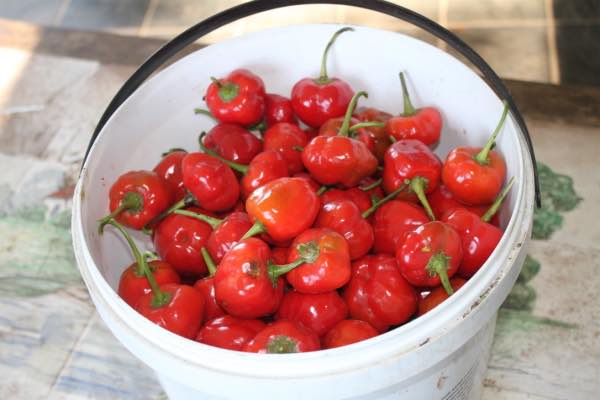
Food choices are growing worse in South Africa for those who have no desire to garden.
Grandchildren
There are few more important things to my mind than handing down the treasures and values of each generation to the next. This morning my fussy-eating granddaughter asked for a sip of granny's perfect butternut smoothie having no idea what was in it. At lunch she was back demanding that I teach her how to make it for herself. That made my day.
We do our best in South Africa to remain a people of hope. It means helping the poor to get quality food. Yellow maizemeal is another good source of beta-carotene. It's entailed purchasing an industrial mill since whole grains cannot be readily purchased at the grocery store.
Of course we score too, having a quality food readily available for a very low price; true wholegrain grits at 1/20th of the markup of cornflakes and a hundred times richer in nutrients, a thousand-fold more tasty. I'm not exaggerating.

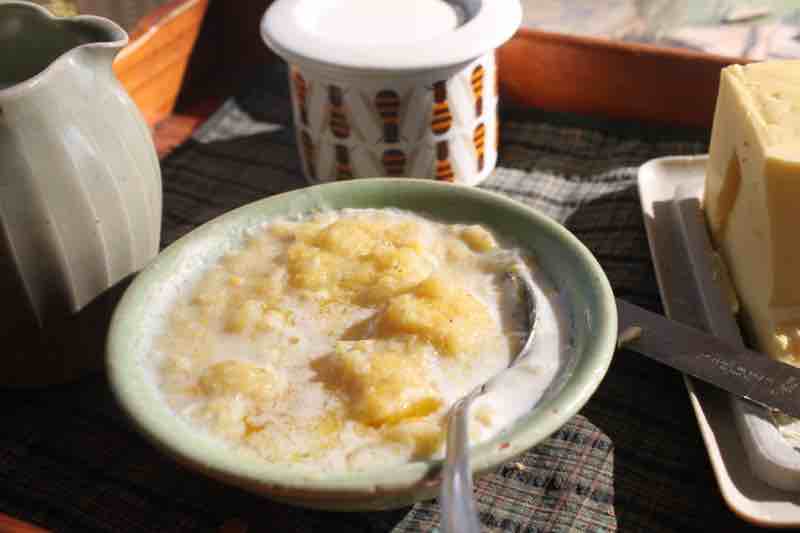
When browsing use right click and "Open Link in New Tab" or you may get a bad gateway signal.
From the horse's mouth
The material expressed on this page is gleaned from the nutritional and environmental literature; it is clearly referenced. A plain distinction is made between the author's opinion and that which is scientifically proven. When in doubt consult your health professional.
To suggest a correction or clarification, write to Dr Bernard Preston here. Contact.
Newsletter
Our newsletter is entitled "create a cyan zone" at your home, preserving both yourself and Mother Earth for future generations; and the family too, of course. We promise not to spam you with daily emails promoting various products. You may get an occasional nudge to buy one of my books.
Here are the back issues.
- Lifestyle and ideal body weight
- What are ultra-processed foods?
- Investing in long-term health
- Diseases from plastic exposure
- Intensive lifestyle management for obesity has limited value
- A world largely devoid of Parkinson's Disease
- The impact of friendly bacteria in the tum on the prevention of cancer
- There's a hole in the bucket
- Everyone is talking about weight loss drugs
- Pull the sweet tooth
- If you suffer from heartburn plant a susu
- Refined maize meal and stunting
- Should agriculture and industry get priority for water and electricity?
- Nature is calling
- Mill your own flour
- Bake your own sourdough bread
- Microplastics from our water
- Alternative types of water storage
- Wear your clothes out
- Comfort foods
- Create a bee-friendly environment
- Go to bed slightly hungry
- Keep bees
- Blue zone folk are religious
- Reduce plastic waste
- Family is important
- What can go in compost?
- Grow broad beans for longevity
- Harvest and store sunshine
- Blue zone exercise
- Harvest and store your rainwater
- Create a cyan zone at your home
Did you find this page interesting? How about forwarding it to a friendly book or food junkie? Better still, a social media tick would help.
Address:
56 Groenekloof Rd,
Hilton, KZN
South Africa
Website:
https://www.bernard-preston.com